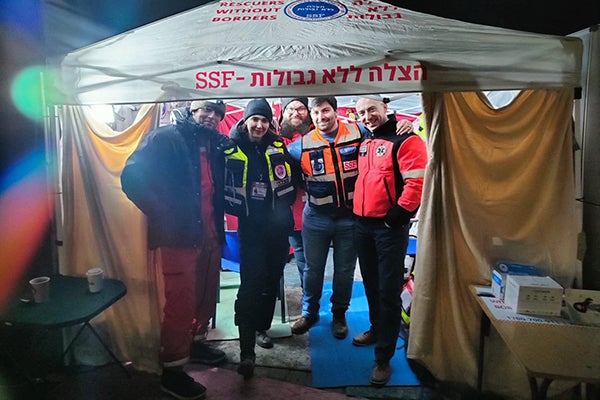ECU alumnus, doctor helping refugees near Ukrainian border
When Dr. Alberto Castro Bigalli, 2021 graduate of the Brody School of Medicine at East Carolina University, saw Russia’s invasion of Ukraine unfolding and the flood of refugees heading for the border, he knew he needed to help.
Bigalli immediately began calling organizations and contacting friends to see where he could help. Within four days he joined his friend and mentor, Dr. Laura Bukavina, in Medyka, Poland at the Ukrainian border to help refugees. Medyka has been the busiest border crossing since the war with Russia started with 50,000 to 100,000 people crossing each day.
Bigalli arrived in Poland around March 3 and stayed two weeks. He said borders were chaotic in the early days of the invasion. He compared it to hurricane response in eastern North Carolina.
“It takes weeks for organized help from the government to arrive after a hurricane. People in flooded areas wait at least two weeks for assistance. That wait is even longer in other countries when emergencies happen,” he said.
Bigalli said he was willing to go to the border to help in any way — clean, transport — whatever needed to be done. Shortly after arriving, Bukavina, who had traveled from the United States to Poland, contacted Bigalli because doctors were needed. Bukavina, her husband Pavlo and brother Antoniy are all Ukrainian-American and were at the border assisting refugees working with the organization SSF – Rescuers Without Borders.
Bigalli said he relied on non-verbal cues because he did not speak the language. Originally from Ecuador, Bigalli came to the U.S. when he was 9 years old and did not speak English. He learned how to communicate with classmates until he picked up the language. He said he reverted to the skills he learned during that time in his life to communicate with the refugees.
“I also held up a sign that said, ‘Tea Coffee Medicine,’ in Ukrainian and people would point to what they needed. If they pointed to medicine, I took them to the tent for care,” he said.
Due to Ukraine’s requirement for men between 18 and 60 to stay and fight, those crossing the border were women, children and the elderly.
“There were men and women in their 80s and 90s carrying heavy loads and traveling for days in the cold. I met a couple in their 90s that had been displaced three times in their lives due to war — World War II, Crimea in 2014 and now this,” Bigalli said.
He said the lines on the Ukrainian side of the border to get into Poland were as long as four days. People waited in the frigid cold to cross. Once in Poland, the refugees needed to be treated for high blood pressure, diabetes, sprains and other injuries. Many women were pregnant or had traveled with children, putting their own needs for food and medical care aside to get the children to safety.
“One woman came to us with stage 4 kidney failure. She was on dialysis in Ukraine but had not received treatment since leaving. We treated her the best we could and sent her to the hospital, but the hospital was full. That was what we were dealing with.”

Bigalli stands with other volunteers at the Poland/Ukraine border in early March. (Contributed photo)
Bigalli heard stories of elderly people traveling 40 hours and of people traveling on trains in trailers meant for 40 people carrying close to 200.
Due to the chaotic conditions in what Bigalli referred to as the neutral zone in Ukraine just before entering Poland, medications and medical care were not easily accessible. Since he and a few others had American paperwork, they were allowed to cross the border and walk supplies over. This was when he witnessed more of the heartbreak of war.
“There were about 10 children dead, about eight had been trampled,” he said. “I saw these cars turning around and I wondered why they were going back to Ukraine. Then I realized, it was husbands and fathers leaving their wives and children at the border to go back and fight.”
Despite the sadness and despair he witnessed, Bigalli said, “Ukrainian people are resilient. They’re going to be OK. We need to do our part, our collective part to make this go away.”
Bigalli stressed how important it is for those watching the war unfold in the comfort of their homes to not become complacent with what’s taking place.
“It’s all we hear and care about for weeks; then we don’t talk about it any longer. I don’t want it to become a war that is forgotten. We don’t need to think that someone else will take care of it.”
Bigalli returned on March 23 and recently learned he will return in early April. The war in Ukraine is not the first time the doctor has volunteered after significant world events. He volunteered in Ecuador after a devastating earthquake in 2016.
He has returned to his research internship at FoxChase Genitourinary Oncology in Philadelphia now that he is back in the United States. He admits it’s hard to switch back into his routine after sending time at the border.
“It’s difficult to pull yourself away because the people you meet stay with you forever. The people hug and kiss you because they are so grateful. That warmth stays with you.”
He said he has a good support system and strong faith that has helped him return to some normalcy, and he stays connected through group chats with what is going on at the border.
Bigalli also helps through a few different charities, Cleveland Maidan and MedWish. The sight of so many children being displaced is one he mentions often. As a result, he is collecting bookbags filled with school supplies to send to Ukrainian children starting over in new schools in different countries. Those wishing to contribute can contact Cleveland Maiden or MedWish.